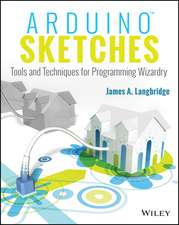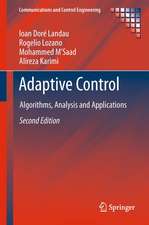Adaptive Control: Communications and Control Engineering
Autor Rogelio Lozanoen Limba Engleză Hardback – 5 noi 1997
| Toate formatele și edițiile | Preț | Express |
|---|---|---|
| Paperback (1) | 958.07 lei 6-8 săpt. | |
| SPRINGER LONDON – 21 sep 2012 | 958.07 lei 6-8 săpt. | |
| Hardback (1) | 961.55 lei 6-8 săpt. | |
| SPRINGER LONDON – 5 noi 1997 | 961.55 lei 6-8 săpt. |
Din seria Communications and Control Engineering
- 15%
 Preț: 659.70 lei
Preț: 659.70 lei - 20%
 Preț: 879.74 lei
Preț: 879.74 lei - 18%
 Preț: 953.65 lei
Preț: 953.65 lei - 18%
 Preț: 1117.03 lei
Preț: 1117.03 lei - 9%
 Preț: 1385.77 lei
Preț: 1385.77 lei - 18%
 Preț: 1128.08 lei
Preț: 1128.08 lei - 18%
 Preț: 953.65 lei
Preț: 953.65 lei - 15%
 Preț: 656.89 lei
Preț: 656.89 lei - 18%
 Preț: 896.52 lei
Preț: 896.52 lei - 18%
 Preț: 1113.26 lei
Preț: 1113.26 lei - 18%
 Preț: 1388.22 lei
Preț: 1388.22 lei - 15%
 Preț: 647.27 lei
Preț: 647.27 lei - 18%
 Preț: 954.45 lei
Preț: 954.45 lei - 18%
 Preț: 1231.47 lei
Preț: 1231.47 lei - 18%
 Preț: 948.92 lei
Preț: 948.92 lei - 18%
 Preț: 1232.57 lei
Preț: 1232.57 lei - 18%
 Preț: 1127.28 lei
Preț: 1127.28 lei - 15%
 Preț: 643.34 lei
Preț: 643.34 lei - 18%
 Preț: 1401.30 lei
Preț: 1401.30 lei - 15%
 Preț: 651.51 lei
Preț: 651.51 lei - 20%
 Preț: 1454.07 lei
Preț: 1454.07 lei - 18%
 Preț: 948.79 lei
Preț: 948.79 lei - 18%
 Preț: 1233.06 lei
Preț: 1233.06 lei - 18%
 Preț: 947.85 lei
Preț: 947.85 lei - 18%
 Preț: 950.96 lei
Preț: 950.96 lei - 18%
 Preț: 956.99 lei
Preț: 956.99 lei - 15%
 Preț: 644.18 lei
Preț: 644.18 lei - 18%
 Preț: 946.87 lei
Preț: 946.87 lei - 18%
 Preț: 951.14 lei
Preț: 951.14 lei - 15%
 Preț: 644.18 lei
Preț: 644.18 lei - 20%
 Preț: 990.80 lei
Preț: 990.80 lei - 18%
 Preț: 1006.72 lei
Preț: 1006.72 lei - 18%
 Preț: 942.44 lei
Preț: 942.44 lei - 18%
 Preț: 1233.06 lei
Preț: 1233.06 lei - 15%
 Preț: 641.85 lei
Preț: 641.85 lei - 18%
 Preț: 957.75 lei
Preț: 957.75 lei - 15%
 Preț: 649.87 lei
Preț: 649.87 lei - 18%
 Preț: 958.07 lei
Preț: 958.07 lei - 18%
 Preț: 1117.99 lei
Preț: 1117.99 lei - 18%
 Preț: 1395.94 lei
Preț: 1395.94 lei - 18%
 Preț: 781.62 lei
Preț: 781.62 lei - 18%
 Preț: 953.20 lei
Preț: 953.20 lei - 18%
 Preț: 1109.78 lei
Preț: 1109.78 lei
Preț: 961.55 lei
Preț vechi: 1172.62 lei
-18% Nou
Puncte Express: 1442
Preț estimativ în valută:
184.01€ • 199.81$ • 154.57£
184.01€ • 199.81$ • 154.57£
Carte tipărită la comandă
Livrare economică 22 aprilie-06 mai
Preluare comenzi: 021 569.72.76
Specificații
ISBN-13: 9783540761877
ISBN-10: 354076187X
Pagini: 584
Ilustrații: XX, 562 p.
Dimensiuni: 155 x 235 x 31 mm
Greutate: 0.91 kg
Ediția:1998
Editura: SPRINGER LONDON
Colecția Springer
Seria Communications and Control Engineering
Locul publicării:London, United Kingdom
ISBN-10: 354076187X
Pagini: 584
Ilustrații: XX, 562 p.
Dimensiuni: 155 x 235 x 31 mm
Greutate: 0.91 kg
Ediția:1998
Editura: SPRINGER LONDON
Colecția Springer
Seria Communications and Control Engineering
Locul publicării:London, United Kingdom
Public țintă
ResearchCuprins
to Adaptive Control.- Adaptive Control - Why?.- Adaptive Control Versus Conventional Feedback Control.- Basic Adaptive Control Schemes.- Examples.- A Brief Historical Note.- Concluding Remarks.- Discrete Time System Models for Control.- Deterministic Environment.- Stochastic Environment.- Concluding Remarks.- Problems.- Parameter Adaptation Algorithms - Deterministic Environment.- The Problem.- PAA - Examples.- Stability of Parameter Adaptation Algorithms.- Parametric Convergence.- Concluding Remarks.- Problems.- Parameter Adaptation Algorithms - Stochastic Environment.- Effect of Stochastic Disturbances.- The Averaging Method.- The Martingale Approach.- The Frequency Domain Approach.- Concluding Remarks.- Problems.- Recursive Plant Model Identification in Open Loop.- Recursive Identification in the Context of System Identification.- Structure of Recursive Parameter Estimation Algorithms.- Identification Methods (Type I).- Validation of the Models Identified with Type I Methods.- Identification Methods (Type II).- Validation of the Models Identified with Type II Methods.- Selection of the Pseudo Random Binary Sequence.- Model Order Selection.- An Example: Identification of a Flexible Transmission.- Concluding Remarks.- Problems.- Adaptive Prediction.- The Problem.- Adaptive Prediction - Deterministic Case.- Adaptive Prediction - Stochastic Case.- Concluding Remarks.- Problems.- Digital Control Strategies.- Canonical Form for Digital Controllers.- Pole Placement.- Tracking and Regulation with Independent Objectives.- Tracking and Regulation with Weighted Input.- Minimum Variance Tracking and Regulation.- Generalized Predictive Control.- Linear Quadratic Control.- Concluding Remarks.- Problems.- Robust Digital Control Design.- The Robustness Problem.- The Sensitivity Functions.- Robust Stability.- Definition of “Templates” for the Sensitivity Functions.- Properties of the Sensitivity Functions.- Shaping the Sensitivity Functions.- Example: Robust Digital Control of a Flexible Transmission.- Concluding Remarks.- Problems.- Recursive Plant Model Identification in Closed Loop.- The Problem.- Closed Loop Output Error Algorithms.- Filtered Open Loop Recursive Identification Algorithms.- Frequency Distribution of the Asymptotic Bias in Closed Loop Identification.- Validation of Models Identified in Closed Loop.- Comparative Evaluation of the Various Algorithms.- Concluding Remarks.- Problems.- Robust Parameter Estimation.- The Problem.- Input/Output Data Filtering.- Effect of Disturbances.- PAA with Dead Zone.- PAA with Projection.- Data Normalization.- A Robust Parameter Estimation Scheme.- Concluding Remarks.- Problems.- Direct Adaptive Control.- Adaptive Tracking and Regulation with Independent Objectives.- Adaptive Tracking and Regulation with Weighted Input.- Adaptive Minimum Variance Tracking and Regulation.- Adaptive Generalized Minimum Variance Control.- Robust Direct Adaptive Control.- An example.- Concluding Remarks.- Problems.- Indirect Adaptive Control.- Adaptive Pole Placement.- Robust Indirect Adaptive Control.- Adaptive Generalized Predictive Control.- Adaptive Linear Quadratic Control.- Iterative Identification in Closed Loop and Controller Redesign.- An Example.- Concluding Remarks.- Practical Aspects and Applications.- The Digital Control System.- The Parameter Adaptation Algorithm.- Adaptive Control Algorithms.- Initialization of Adaptive Control Schemes.- Supervision.- Iterative Identification in Closed Loop and Controller Redesign.- Adaptive Tracking and Robust Regulation.- Indirect Adaptive Control.- ConcludingRemarks.- A Perspective View and Further Reading.- Stochastic Processes.- Stability.- Passive (Hyperstable) Systems.- Passive (Hyperstable) Systems.- Passivity - Some Definitions.- Discrete Linear Time-Invariant Passive Systems.- Discrete Linear Time-Varying Passive Systems.- Stability of Feedback Interconnected Systems.- Hyperstability and Small Gain.- Martingales.
Recenzii
From the reviews:
In conclusion, I found this book well written, interesting and easy to follow, so that it constitutes a valuable addition to the existing monographies in adaptive control for discrete-time linear systems. Moreover, the organization of the book makes it suitable (at least in part) for use in graduate courses in adaptive control.
Automatica 38 (2002) 1093 – 1094 (Reviewer: Patrizio Tomei)
In conclusion, I found this book well written, interesting and easy to follow, so that it constitutes a valuable addition to the existing monographies in adaptive control for discrete-time linear systems. Moreover, the organization of the book makes it suitable (at least in part) for use in graduate courses in adaptive control.
Automatica 38 (2002) 1093 – 1094 (Reviewer: Patrizio Tomei)
Textul de pe ultima copertă
Adaptive Control provides techniques for automatic, real-time adjustments in controller parameters with a view to achieving and/or maintaining a desirable level of system performance in the presence of unknown or variable process parameters.
Many aspects of the field are dealt with in coherent and orderly fashion, starting with the problems posed by system uncertainties and moving on to the presentation of solutions and their practical significance. Within the general context of recent developments, the book looks at:
• synthesis and analysis of parameter adaptation algorithms;
• recursive plant-model identification in open and closed loop;
• robust digital control for adaptive control;
• direct and indirect adaptive control; and
• practical aspects and applications.
To reflect the importance of digital computers for the application of adaptive control techniques, discrete-time aspects are emphasized. To guide the reader, the book contains various applications of adaptive control techniques.
Many aspects of the field are dealt with in coherent and orderly fashion, starting with the problems posed by system uncertainties and moving on to the presentation of solutions and their practical significance. Within the general context of recent developments, the book looks at:
• synthesis and analysis of parameter adaptation algorithms;
• recursive plant-model identification in open and closed loop;
• robust digital control for adaptive control;
• direct and indirect adaptive control; and
• practical aspects and applications.
To reflect the importance of digital computers for the application of adaptive control techniques, discrete-time aspects are emphasized. To guide the reader, the book contains various applications of adaptive control techniques.
Caracteristici
Provides the reader with a comprehensive guide to the ideas of adaptive control and the solutions it provides to system uncertainties Gives the reader a comparative overview of the importance of various digital computer configurations in implementing adaptive control Provides practical advice on the synthesis of parameter adaptation algorithms including robust algorithms


















